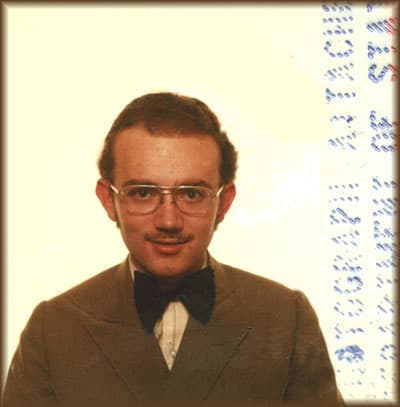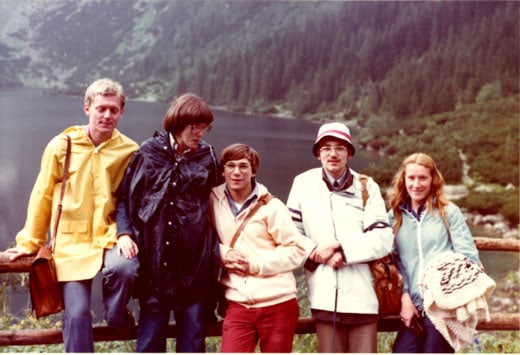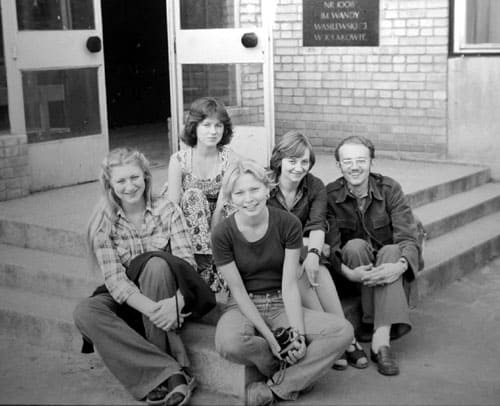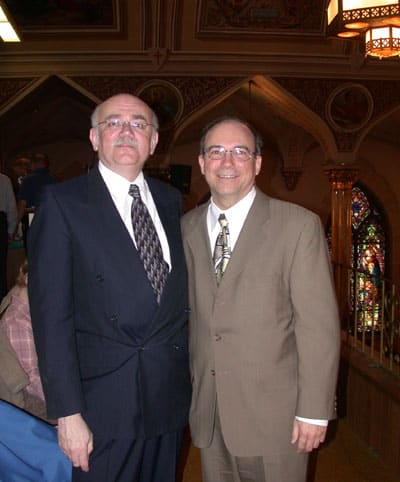
I hope to read other accounts in the next Kosciuszko Foundation newsletter. For all those who went, it was an important episode in their lives, for some it was a life changing experience.

I had my passport, obtained the previous year so that it would have the US Bicentennial cover, my Polish visa, and a round trip ticket on a Pan-Am charter flight. I arrived in a country that was somewhat familiar but not quite. On meeting with cousins whom I had not seen since 1963, the first comment was: “You sure have an American accent to your Polish.”
Author’s passport picture from 1976
That accent would get polished out once I got down to Krakow and started on a well planned 4 week program of language, culture and history studies that the Jagiellonian University had arranged in cooperation with the Kosciuszko Foundation. The accommodations at the “Dom Studentek Piast” were spartan but food at the dining hall was superb. Each morning started with a few musical notes from the wired-network speaker that was part of every room’s decor. The day included lectures on various cultural-historical topics, and the all-important language study.
There were evening events, special showings of films, including “Krzyzacy” [The Teutonic Knights] and “Potop” [The Deluge], and plays. We were able to sample the work of the then famous avant-garde STU theater group which performed in a circus tent outside of town. Plays included “Szalona Lokomotywa” [Runaway Locomotive] by Stanislaw Ignacy Witkiewicz, under direction of Krzysztof Jasinski; and “Pacjenci” [Patients] created by Krystya Gonet and Krzysztof Jasinski on the basis of “Master and Margaret” by Michail Bulhakow. At the Teatr Stary, now the Helena Modjeska Theater, we saw the more conventional “Wesele” [The Wedding] by Stanislaw Wyspianski. Best of all was interacting with the ancient city, the people, and the exploration of its multifold charms. There was no shortage of fun and cheer. One late night party at the student union ended with all — over one hundred Americans and their Polish hosts — joining a somewhat intoxicated conga line that made its way about the dance floor to the theme music from “Bonanza.” This was contemporary Polish culture that we, used to Polkas and Polonaises at the local Polish Home, had never imagined.
That year marked an imperceptible beginning of the decline of the Edward Gierek regime. In this period life had never been better for the Poles since WWII, but it was impossible to ignore the fact that the country operated under a peoples’ democracy — communist inspired — government. In our history courses the English language lecturers steered around or gave “official” versions of events relating to topics like the Miracle on the Vistula in 1920, Pilsudski’s pivotal role in Poland’s rebirth, the Katyn massacre, the Poznan incidents of 1956, and a score of other major or minor subjects. These could only be discussed only on a more informal level. Yet on the whole, despite the propaganda gloss that was sometimes more than less apparent, our hosts treated us with genuine affection and hospitality that is such a great part of the Polish way.

At the Morskie Oko Lake in the Tatras (L. to R.) Roman Czarny (later cultural attaché at the Polish Consulate in Los Angeles), a representative of the Kosciuszko Foundation, Jeffrey Chirgwin, Peter Obst, student (name unknown).
On weekends we visited Zakopane, Wieliczka, Auschwitz and other places of note. The fifth week was devoted to a tour of the country on the route Krakow-Warsaw with stops in the historic towns of Sandomierz and Kazimierz Dolny. As we rolled through the countryside aboard our Iran National Mercedes bus we traded songs with our pilot guides. They sang a repertoire of popular Polish tunes, we replied with hits of the American musical theater. Then, after a few days in Warsaw, the group broke up and flew to their various points of origin. All took back a very much different vision of contemporary Poland than they had on arrival.
Coming back I also brought back academic credits earned for taking the course. These are accepted by most American universities and proved very useful when I later applied to enter the Central and Eastern European Studies masters program at LaSalle University.

Participants in one of the many small groups studying the Polish language at the Wanda Wasilewska grammar school in Krakow. P. Obst is on extreme right.
I made many friends that summer, both among the Poles and the Americans. This would later lead me to explore the Polish community at Panna Maria, Texas in 1979, visit Toronto and Buffalo on innumerable occasions, and in 2006 travel to the post-industrial town of Holyoke, Massachusetts, where I reunited with Jeffrey Chirgwin, a fellow student from the program. 
The changes in Poland since 1989 affected the flavor of the summer program at the Jagiellonian. Now there is an openness in which all topics may by discussed inside the lecture hall and the realization that Poland, with its EU membership, is once again a member of the greater family of European Nations. But the hospitality, sense of adventure and discovery are still there in Krakow, the ancient Polish city that has no equal in the world.
After many years (l. to r.) Peter Obst i Jeffrey Chirgwin met in Holyoke, Massachusetts, April 2006 r.
Various universities and organizations create programs and symposia that aim at an exploration of what may be called the “Polish reality” — that elusive combination of history, cultural and political influences. While these sessions may be worthwhile on both scholarly and social planes, there is no program, no location in the world, that can hope to measure up to several summer weeks spent in Krakow on the Vistula. If you are serious about getting in touch with your Polish roots, or just want an unforgettable summer experience, now is the time to plan for next summer and look into the Summer Programs on the Kosciuszko Foundation website. If you go, you will not regret it.
by Peter J. Obst
The author lectures in Polish Cultural History and Foreign Literature at LaSalle University in Philadelphia, PA.
